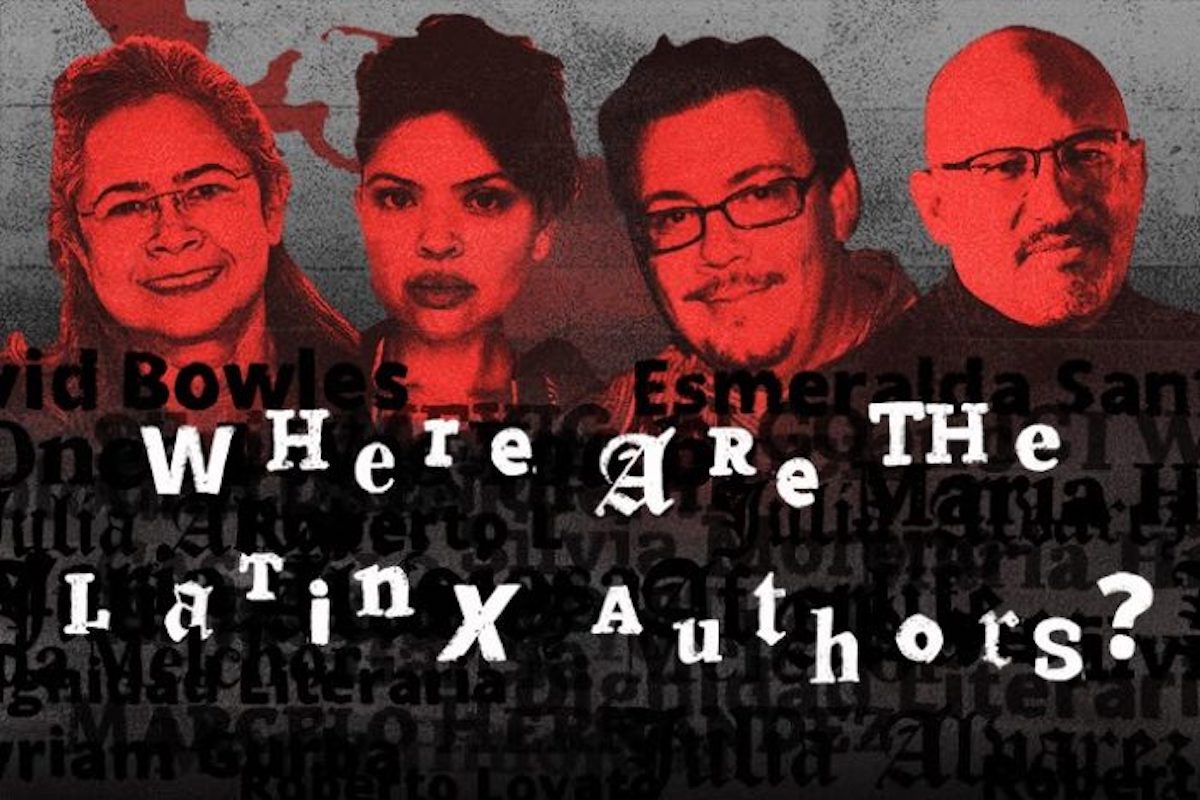

Latinx authors from left to right: Esmeralda Santiago, Myriam Gurba, David Bowles, and Roberto Lovato. Photo credit: Designed by Mathilde Fallot / WhoWhatWhy, Larry D. Moore/ Wikimedia Nayobim / Wikimedia David Bowles / Instagram Roberto Lovato / KQED
It’s no surprise that publications and magazines had many of the same books on their “Best of 2020” book lists. The lists had something else in common: a minuscule selection, if any, of books by Latinx authors. Most included between zero and three books. National Public Radio had by far the highest number of Latinx books on its list—12, though that represented just three percent of the 383 books it featured on what was the largest list out there.
So the question is: where are the Latinx voices and stories?
“You have a population of 60 million that is pretty thoroughly erased. That doesn’t happen así nada más (just like that),” said Roberto Lovato, an outspoken educator, journalist, writer, and activist born in San Francisco to Salvadoran immigrants. “That happens with intentionality, and I think the intentionality is an elite belief that there’s not enough room for Latinx people.”
As a journalist, Lovato reported on the child separation crisis and found that much of the coverage on the issue excluded Central American voices, including Salvadorans. “I’m here, a salvadoreño born in the U.S., and they don’t even put us in the stories in the newspapers, much less in publishing.”
The Numbers
Along with a lack of Latinx books on American shelves, there is a lack of Latinx people working in the American publishing industry.
Hispanic and Latino Americans make up 18.4 percent of the total US population as of 2019, according to the United States Census Bureau. However, a survey by Lee & Low Books found that only 6 percent of the workforce in the publishing industry as a whole identified as Latinx/Latino/Mexican in 2019. And the situation was even worse within their editorial departments, where just 2 percent were Latinx/Latino/Mexican. Latinx stories are essential, but without greater diversity in the publishing workforce, how can Latinx words and voices be seen and heard in the U.S.?
An Especially Difficult Journey to Publication for Latinx Authors
Before the novel The Smoking Mirror was published and named a Pura Belpré Honor book in 2016, it was rejected by all 25 literary agents Mexican American author David Bowles had submitted it to.
“I knew that I had a good manuscript and that it could have a good readership. But what was the barrier was the fact that there were no white characters and everybody was Mexican American or Mexican,” said Bowles, who is from South Texas.
Bowles, who is also a translator and professor at the University of Texas Rio Grande Valley, wrote an action-packed, middle-grade novel that portrays contemporary life in South Texas and Mexico, and features Aztec and Mayan mythology. He wrote it in English but also used Spanish words and phrases throughout the book.
“The names of the Aztec and Mayan gods were too hard in the editor’s opinion,” Bowles said. “They would ask me things like, ‘Can’t you add a white sidekick? Can’t you cut down on the Spanish? This is so much Spanish.’ To me, there wasn’t even that much Spanish.”
When he stood his ground, editors told him they wouldn’t be able to market his book because there was no readership for it. “One of them essentially said to me that Mexican Americans, Latinx people, don’t read books, and so they don’t buy books,” Bowles added
Bowles felt he couldn’t connect to the editors that read —and rejected— his work. “I’m writing about Mexicans and Mexican Americans and you’re a white dude living in New England. Of course there’s a disconnect,” Bowles said. “But that doesn’t mean that you shouldn’t take a chance on what I’m writing, and that doesn’t mean that there’s not an audience for it just because you don’t get it.”
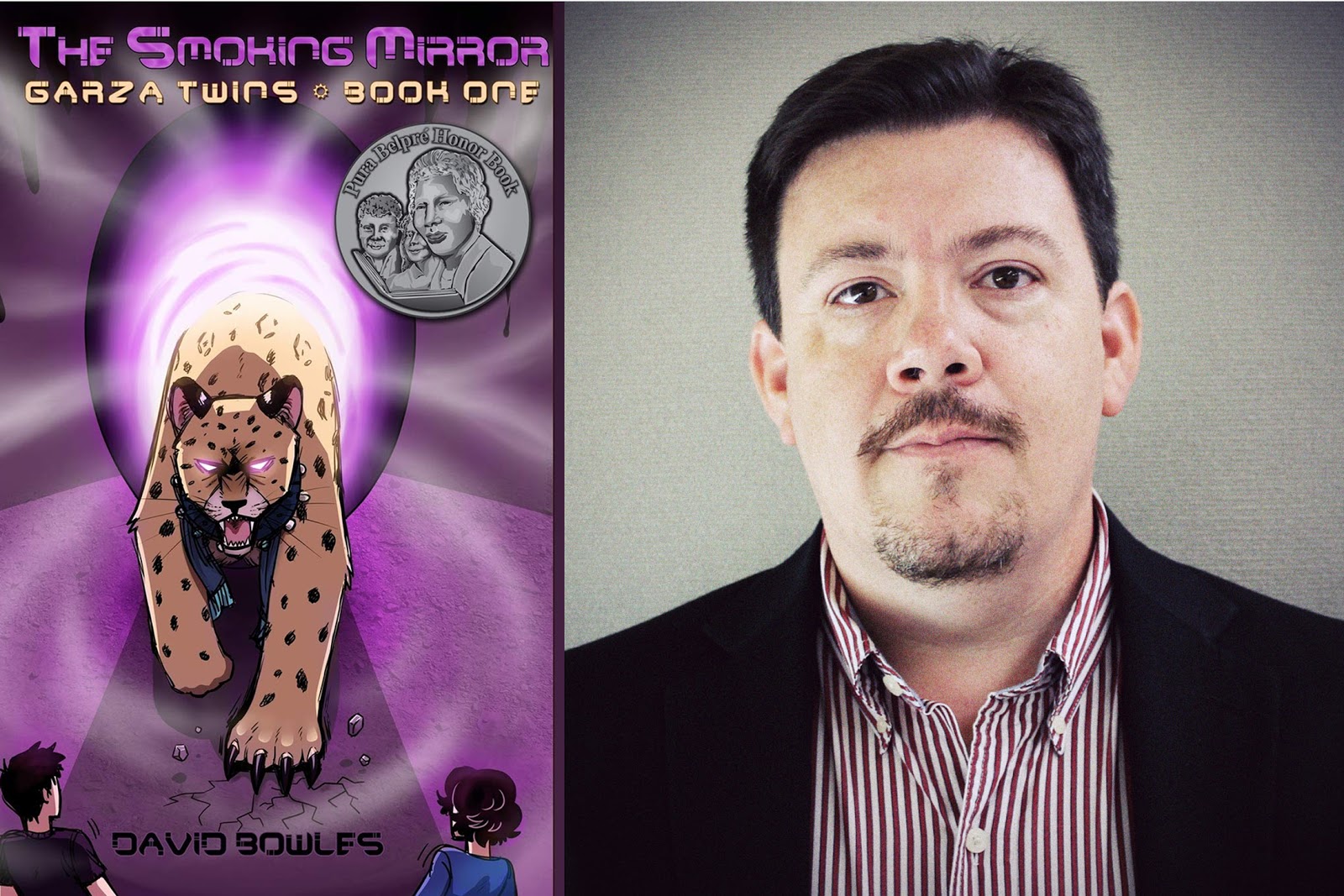

The Smoking Mirror by David Bowles. (Photo credit: IFWG Publishing International and DavidBowles.us)
Eventually, Bowles turned to indie publishers and university presses. Once his work started winning awards, medium-sized presses became interested, and eventually so did the powerhouses in American trade publishing, known as the “Big Four.” Last year, HarperCollins Publishers started publishing Bowles’s 13th Street series.
Noted Puerto Rican writer Esmeralda Santiago had a somewhat easier experience. “I began to write by publishing essays on the local weekly, not a fancy newspaper or anything like that. I had some very good responses from my neighbors and readers in this particular small newsweekly.”
This gave Santiago the courage to send her work out cold to news publications. “There was a lot of rejection, but every once in a while, something would hit. I was getting published really as an essayist, with increasingly more visible outlets. Eventually, I was published by the Boston Globe, the New York Times, and so forth.”
Eventually, the Radcliffe Quarterly, a college alumnae publication, asked Santiago to write an essay about women and work. She wrote about her mother’s struggles as a single mother and how she used her skills as a seamstress to bring her children from Puerto Rico to New York with her.
It was an essay that changed Santiago’s life. “That essay came to the eyes of an editor from a nonfiction publishing house. She got in touch with me and said, ‘I saw that article, that essay that you wrote in the alumnae magazine. I thought it was really very moving. Do you have any more essays like that?’ I sent her about 200 or 300 typed copies of all my little essays from everywhere.”
The editor then invited Santiago to her office. “She just looked me in the eye and said, ‘We would like to offer you a contract to write a memoir.’ I just looked at her like… ‘Does it pay?’ I just had no idea what she was talking about. I was not a memoir reader at the time, I wasn’t even sure what a memoir was,” Santiago recalled.
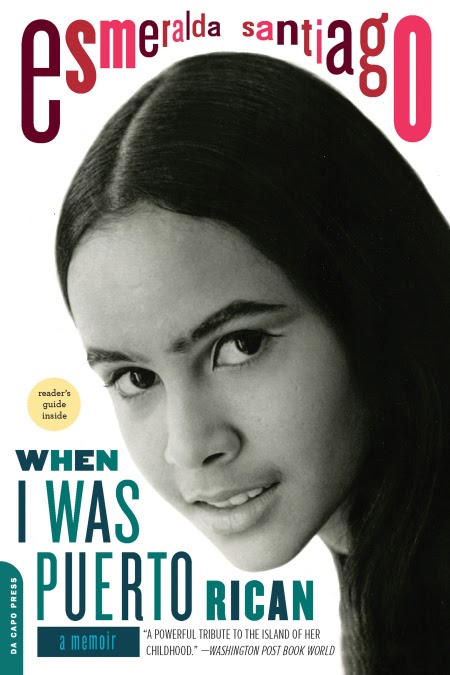

When I Was Puerto Rican: A Memoir by Esmeralda Santiago. (Photo credit: Da Capo Press)
“The very first big interest in my work came from this Cinderella story kind of thing. She [the editor] said, ‘We would like you to write a book about your life.’ Nobody had ever asked me anything like that in my life. It’s really different from the experience of most writers.” Santiago’s autobiography, When I Was Puerto Rican, was published in 1993 by Addison-Wesley Publishing.
But getting published in the United States is often a long and difficult road for Latinx writers. Take Lovato, who eventually found that having learned about strategy in war-torn El Salvador as a Farabundo Martí National Liberation Front (FMLN) guerrillero during its civil war would help him publish his first book years later.
After returning to the United States, Lovato decided to write his first book in 2015. “I had to figure out how to get from Point A, which is nowhere, [to Point B]. I want to be published by a major publishing house. I want to be paid well and I want the book to get recognized, which is a difficult thing for any Latinx or Latino writer, but especially, for example, for Salvadoreños.”
Lovato spent six months strategizing, and eventually his book, Unforgetting: A Memoir of Family, Migration, Gangs, and Revolution in the Americas, became the first book about Salvadorans, written by a Salvadoran, to be published by one of the “Big Four”—HarperCollins Publishers.
Lovato and Bowles broke through. Lovato is currently writing his second book, and Bowles has 12 books coming out this year with different publishers. But it was a hard journey for both. Bowles didn’t get to publish his first book until he was 41. “It is just really tough. There are so many layers of gatekeepers,” Bowles said. “Even if you get an agent to sell your book to an editor, it was tougher before it got easier. I will admit that things have gotten slightly better, but not nearly as good as they need to be. We’re still way behind where we need to be.”
For his part, Lovato made it even more plain: “We’re genetically incapable of writing our own stories. That’s what the system would have us believe.”
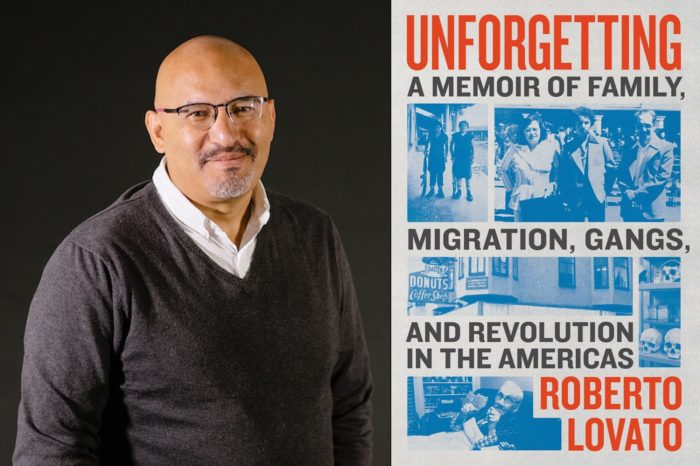

Unforgetting: A Memoir of Family, Migration, Gangs, and Revolution in the Americas by Roberto Lovato. (Photo credit: Harper Collins and RobertoLovato.com)
The Birth of #DignidadLiteraria
The heavy promotion and acclaim last year for a book titled American Dirt added fuel to an already burning fire among Latinx writers and thinkers. The novel follows a middle-class Mexican woman as she flees cartel violence-ridden Mexico with her son, headed to the United States as immigrants. It was written with a hefty seven-figure advance by Jeanine Cummins, who is not Mexican or Central American. She’s an American who self-identified as white in an opinion piece she wrote for the New York Times in 2015. But four years later in an interview promoting American Dirt, Cummins identified as Latinx (she has noted since the controversy that she has a Puerto Rican grandmother). “I was resistant, initially, to writing from the point of view of a Mexican migrant because, no matter how much research I did, regardless of the fact that I’m Latinx, I didn’t feel qualified to write in that voice.”
The book received initial praise before a scathing review by Mexican American writer Myriam Gurba, who deemed it a one-dimensional, appropriating work with absurd Mexican stereotypes and inaccuracies. Uproar exploded online as members of the Latinx community expressed deep criticism of the book, to the point where 142 writers signed an open letter to Oprah Winfrey asking her to remove the novel from her influential list of book club picks.
In a direct response to the book, Lovato, Bowles, and Gurba co-founded #DignidadLiteraria (Literary Dignity) on Twitter. The hashtag evolved into a grassroots campaign for greater Latinx inclusion in the US publishing industry, “advocating for equity and literary justice for the more than 60 million Latinx persons left off of bookshelves in the United States and out of the national dialogue.”
In creating the hashtag, Lovato was heavily influenced by Latin American revolutionary politics and strategy. “Allá se habla mucho de la dignidad. De la dignidad humana. (Over there [in Latin America], there is a lot of talk of dignity. Human dignity),” Lovato explained.
It Starts With Children’s Books
According to a report by Cooperative Children’s Book Center (CCBC), only 5.3 percent of the 3,716 books it surveyed that were published in 2019 had Latinx main characters. Books with white main characters made up 41.8 percent of the total, with another 29.2 percent comprised of talking animals, robots, cars, or other miscellaneous things—there were more books published about those objects than all books with minority characters combined.
“What happens when kids are only exposed to that is that their view of the world that comes across through the books they read —that they’re required to read in school— is one that centers whiteness,” said Bowles.
“Whiteness is the default and everything else is erased. So for a Latinx child, they internalized the lesson that their culture is not worthy of being included. It’s not worthy of being talked about in books,” he explained. “They learn the lesson that it’s because their language, their culture, their people, the color of their skin, all those things, are not as good as what’s being represented. That obviously is destructive to the identity of a Latinx child.”
What about the white child? According to Bowles, they see themselves centered in all the books they read. “Never sees, or if they do see Latinx people, they are in subservient roles,” Bowles said. “So their idea of what a Latinx person is gets warped, and when they grow up, then they just don’t see them as equally human… if they see them at all.”
As an author who writes a lot of children’s books, Bowles, who lives in Rio Grande Valley, wants parents to read with their children in English and Spanish. “We do have a large immigrant population that is going to continue to grow, and we also have a lot of kids who are bilingual and we ought to be promoting that,” Bowles said.
“People, even in education, treat Spanish as if it’s some kind of like second-class language that kids just use so they can chat with their abuelitos (grandparents). De ahí en fuera, nada que ver con la vida intelectual (from there on out, nothing to do with the intellectual life), and that’s absolutely wrong,” remarked Bowles. “Spanish is a powerful language for literature and intellectual and philosophical thought. Just think about the amazing works that have been written in Spanish over the past 500 years. For people to act like, ‘Oh, these poor children and they speak Spanish, we just got to get them speak English’ as if English were this magical thing—oh God, it just pisses me off to no end.”
Bowles mentioned an important fact: The United States has no national language. “Spanish is not a foreign language in this country. Spanish is a language of residents of the United States and citizens of the United States,” Bowles added. “We need to stop acting like it’s some kind of impediment and start seeing it as something that people should be proud of, as something additional that enriches their lives.”
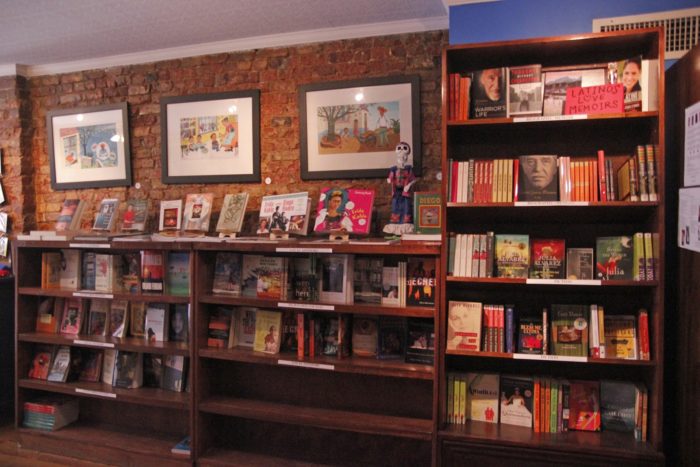

Bookcase in La Casa Azul Bookstore in New York City. (Photo credit: Helga Salinas/Flickr CC BY-SA 2.0)
The Three Hurdles: Editors, Money, and Publicity Resources
Progress starts with hiring more Latinx editors. “Latinx editors will be the ones who will be acquiring Latinx books, because they will recognize the voice and understand the quality. They come from the community. They understand how readership is going to respond,” Bowles said.
Then there’s the money problem: The way money is invested in publishing can elevate diverse voices. “No Latinx author that I know has ever gotten a six-figure advance,” Bowles said. “I haven’t met anybody who ever has, and that may change and may be changing right now, but it’s really, really gross the way money is invested in a very inequitable way to promote white voices over everybody else. That’s changed, I think, for some Black authors. But it’s still not there yet.”
Take the example of Cummins’s book. “Imagine if instead of advancing more than a million dollars to somebody who isn’t Mexican or Mexican American and have them write about the immigrant experience, you had given $50,000 advances to 20 mexicanas y chicanas,” Bowles pondered. “That would’ve changed the game completely. You could have had 20 books for the money you invested in this one book.”
Then there are issues with the way books are or aren’t promoted. The publicity campaign for a new book can determine whether it’s going to be a bestseller or not—as was the case, again, with Cummins’ American Dirt.
“Before the book had even been finished, before it’s even in revision and editing, [Flatiron had] already set everything up for it to be a success,” Bowles explained. “They had already hired a screenwriter that sold the film rights, the translation, they did everything they could to make that a huge success because they wanted it to be. And that’s all it is—when they decide they want a book to become a bestseller, eight times out of 10, it works. If they were to change that model, then they could invest their money differently as well. But it starts with the editors.”
What Do Latinx Readers Want?
Latinx readers want more of everything. Lovato insists Latinx people tell their real-life stories. “Go on this journey into your own family and break the silence,” Lovato said. “We don’t seem to be able to write nonfiction, memoir and all these other different genres. They’re out there, but we’re not published. They’re not allowing us. But most importantly, we’re not allowing ourselves.”
Bowles thinks Latinx people are tired of what’s called trauma porn and the stories of suffering. “We also just want stories that are about our joys,” he said. “Goofy stories, fun stories, romantic stories, science fiction, fantasy. Just all the variety that you see in literature written by and for white people, we should see that in Latinx literature as well.”
But in order to get that broader variety of stories published, Latinx communities need to read the books that already exist for the publishing industry to see that these books are in demand. “If our people are not reading those books, if Latinx teachers are not getting those books in their classrooms, if Latinx librarians are not making sure that Latinx books are in their library, if Latinx booksellers are not making sure those books are prominently displayed in their stores, then we shoot ourselves in the foot,” explained Bowles.
For Lovato, #DignidadLiteraria had the greatest impact on Latinx people themselves. “We ourselves, waking up to the fact that we’ve been abused, ignored, marginalized, insulted by US publishing,” Lovato said. “You have thousands upon thousands of people who had an idea like, ‘Something’s wrong. I don’t see any books about me.’ Suddenly we come together and we realize we’re not alone. Over the long term, that’s the most important thing.”
Santiago also has a message for Latinx writers: “For authors who have been published, who have agents, and editors, and the machine already helping them, bring somebody along with you. That’s really important, because if a publisher is saying, ‘Oh, but we’re not finding enough Honduran writers.’ Well, here’s one that I know. Don’t let them get away with the ‘We can’t find them.’ Of course you can find them, and the first place is to ask somebody who knows,” she said. “If the publishing industry wants to find more Latinx writers, then reach out to the Latinx community.”
Lovato put it this way: “I guess the most important factor is Latinx people ourselves. We allow ourselves to be silenced in publishing. We allow ourselves to be silenced in telling our own stories. We allow ourselves to believe that we can do nothing to change our condition.”
Lovato urges Latinx people to empower themselves. “We are agents in our own change. We are the owners of our own stories and we can either exercise our ownership or not,” he said. “Many of us are not exercising the ownership of our stories. When I talk about the success of #DignidadLiteraria, I think it put una chispita (a spark) in the Latinx imagination. To think things could be different. To think that if we come together, we can make an impact.”
This story was originally published by WhoWhatWhy.
***




I find it incredible that something like 20% of the entire US population is routinely erased mentally in the Anglo majority’s reading lists and most non-Latinx people don’t really seem to care–or notice. I guess we Latinos and Latinas will just have to keep increasing our share of the country’s population. Maybe when the US is 1/4 or perhaps even 1/3 Latinx they’ll notice.
El uso del término “latinx” es parte del problema, la imposición de una cultura.
Ya que esta página publica términos como latino, latina, hispano, etc. también no hay “ninguna imposición de un cultura.” Gracias.
You missed this one:
https://artepublicopress.com/product/we-were-always-here-a-mexican-americans-odyssey-2/
I am the author; publication date is April 30
Macmillan books just released “Of Women and Salt” by Gabriela Garcia. It’s received incredible reviews, including on Oprah. I just read it and the accolades are well-deserved! I’ve been recommending to everyone I know.